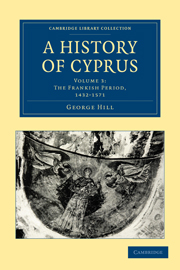Book contents
- Frontmatter
- Contents
- Volume III (1432–1571)
- Chapter IX John II, 1432–58
- Chapter X Charlotte and Louis of Savoy, 1458–64
- Chapter XI James II, 1464–73
- Chapter XII Catherine and James III. Catherine alone, 1473–89
- Chapter XIII Cyprus under Venice
- Chapter XIV The War of Cyprus. I. The Expedition of 1570
- Chapter XV The War of Cyprus. II. The Turkish Conquest
- Chapter XVI The Two Churches, 1220–1571
- Chapter XVII Literature and the Fine Arts
- Note on some Authorities
- Genealogy of the Lusignan Dynasty
- Addenda
- Index
- MEDIEVAL CYPRUS
- Plate section
Chapter XVII - Literature and the Fine Arts
Published online by Cambridge University Press: 07 June 2011
- Frontmatter
- Contents
- Volume III (1432–1571)
- Chapter IX John II, 1432–58
- Chapter X Charlotte and Louis of Savoy, 1458–64
- Chapter XI James II, 1464–73
- Chapter XII Catherine and James III. Catherine alone, 1473–89
- Chapter XIII Cyprus under Venice
- Chapter XIV The War of Cyprus. I. The Expedition of 1570
- Chapter XV The War of Cyprus. II. The Turkish Conquest
- Chapter XVI The Two Churches, 1220–1571
- Chapter XVII Literature and the Fine Arts
- Note on some Authorities
- Genealogy of the Lusignan Dynasty
- Addenda
- Index
- MEDIEVAL CYPRUS
- Plate section
Summary
From the backward condition of the Greek-speaking population of medieval Cyprus it resulted that Cypriotes of unusual intellectual ability were attracted to centres, such as Byzantium, where they found scope for their talents. Writers on the literary history of the island in the Middle Ages usually begin with George (afterwards called Gregory) of Cyprus. But beyond the fact that he was of Cypriote origin, and endeavoured, in vain, to get himself educated in Lefkosia, he has no connexion with the land of his birth; his sphere as theologian and churchman was Byzantium, where he actually filled the patriarchal throne for six years from 1283. He belongs to Byzantine not to Cypriote literary history.
More definitely associated with Cyprus is a lesser George, called Lapethes or Lapithios, who lived in the first half of the fourteenth century, and is known to history as a friend of King Hugh IV, who enjoyed his philosophical and literary conversation. His works include a tedious poem of some fifteen hundred lines on the duties of a citizen, which belies his reputation. But he seems to have been a Latin as well as Greek scholar of some distinction, and from his retreat on St Hilarion corresponded with such men as Nikephoros Gregoras, George Akindynos and the monk Barlaam.
- Type
- Chapter
- Information
- A History of Cyprus , pp. 1105 - 1142Publisher: Cambridge University PressPrint publication year: 2010First published in: 1948

